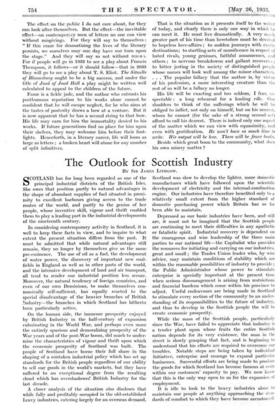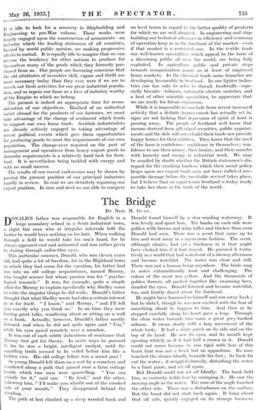The Outlook for Scottish Industry
BY SIR JAMES LITHGOW.
SCOTLAND has for long been regarded as one of the principal industrial districts of the British Isles. She owes that position partly to natural advantages in the shape of abundant supplies of fuel situated in proxi- mity to excellent harbours giving access to the trade routes of the world, and partly to the genius of her people, whose inventive skill, vigour and thrift enabled them to play a leading part in the industrial developments of the nineteenth century.
In considering contemporary activity in Scotland, it is well to keep these facts in view, and to inquire to what extent the present situation differs from the past. It must be admitted that while natural advantages still remain, they no longer by themselves give us the same pre-eminence. The use of oil as a fuel, the development of water power, the discovery of important new coal- fields in England as well as in other parts of the world, and the intensive development of land and air transport, all tend to render our industrial position less secure. Moreover, the natural tendency of foreign countries, and even of our own Dominions, to make themselves eco- nomically self-sufficient, has equally reacted to the special disadvantage of the heavier branches of British Industry—the branches in which Scotland has hitherto been particularly active.
On the human side, the immense prosperity enjoyed by British Industry in the half-century of expansion culminating in the World War, and perhaps even more the entirely spurious and demoralizing prosperity of the War years and of the post-War boom, did much to under- mine the characteristics of vigour and thrift upon which the economic prosperity of Scotland was built. The people of Scotland have borne their full share in the shaping of a mistaken industrial policy which has set up standards for the British people regardless of our ability to sell our goods in the world's markets, but they have suffered to an exceptional degree from the resulting cloud which has overshadowed British Industry for the last decade.
A closer analysis of the situation also discloses that while fully and profitably occupied in the old-established heavy industries, catering largely for an overseas demand, Scotland was slow to develop the lighter, more domestic manufactures which have followed upon the scientific development of electricity and the internal-combustion engine. Our industries have therefore benefited only to a relatively small extent from the higher standard of domestic purchasing power which Britain has so far been able to maintain.
Depressed as our basic industries have been, and still are, it must not be imagined that the Scottish people are .continuing to meet their. difficulties in any apathetic or fatalistic spirit. Industrial recovery is dependent on the courageous and wise leadership of the three main parties to our national life—the Capitalist who provides the resources for initiating and carrying on our industries, great and small ; the Trades Union leader who, by wise advice, may maintain. conditions of. stability which are within the reasonable possibilities of industry to provide ; the Public Administrator whose power to stimulate enterprise is specially important at the present time when serious discouragement is arising from restrictions and financial burdens which come within his province to adjust. Useful endeavours are being made in Scotland to stimulate every section of the community to an under- standing of its responsibilities to the future of industry, and thus to develop in the Scottish people the will to create economic prosperity.
While the mass of the Scottish people, particularly since the War, have failed to appreciate that industry is a tender plant upon whose fruits the entire Scottish nation depends for its very existence, the man in the street is slowly grasping that fact, and is beginning to understand that his efforts are required to overcome our troubles. Notable steps are being taken by individual initiative, enterprise and courage -to expand particular businesses. Successful efforts are being made to produce the goods for which Scotland has become famous at costs within our customers' capacity to pay. We now know that this is the only way open to us for the expansion of employment. It is idle to look to the heavy industries alone to maintain our people at anything approaching the stan- dards of comfort to which they have become accustomed. It is idle to look for a recovery in Shipbuilding and Engineering to pre-War. volume. These works were largely engaged upon the construction of armaments—an industry which the leading statesmen of all countries, backed by world public opinion, are making progressive efforts to curtail. It is equally idle to imagine that we can reverse the tendency for other nations to produce for themselves many of the goods which they formerly pur- chased from us. Our people are becoming conscious that the old attributes of inventive skill, vigour and thrift are more necessary today than they ever were if we are to search out fresh activities for our great industrial popula-. tion, and so regain our fame as a hive of industry worthy of the Empire to which we belong.
The present is indeed an appropriate time for recon- sideration of our objectives. Baulked of an unlimited outlet abroad for the products of our factories, we must take advantage of the change of sentiment which tends. to support our own home trade. Scottish industrialists are already actively engaged in taking advantage of recent political events which give them . opportunities for producing goods to meet the requirements of our own population. The change-over required on the part of management and operatives from heavy export goods to domestic requirements is a relatively hard task for Scot- land. It is nevertheless being tackled with energy and with no small success.
The results of our recent endeavours may be shown by passing the present position of our principal- industries rapidly in review. In coal we are definitely regaining our export position. In iron and steel we are able to compete on level terms in regard to the better quality of products for which we are well situated. In engineering and ship.
building-our technical advances in efficiency and economy of operation keep us in the forefront of the market—even if that market is a restricted one. In the textile trade our well-known specialities, which appeal to the taste of a discerning public all . over the world, are being fully exploited. In agriculture public and private steps towards reorganization assure us at least of improved home markets. In the chemical trade.some branches are developing favourably in Scotland. In our lighter indus- tries one has only to refer to thread, foodstuffs—espe- cially biscuits—tobacco, automatic electric switches, and a host of ' other scientific specialities, to appreciate that we are ready for future expansion.
While it is impossible to conclude from recent increased activity that a definite improvement has actually set in, signs are not lacking that depression of spirit at least is passing away. The people of Scotland well know that income derived from gilt-edged securities, public appoint- ments and the dole will not rebuild their trade nor provide happy homes for their children. They know that the need of the hour is confidence; confidence in themselves; con- fidence to use their money, their brains, and their muscles With honesty and energy in industrial work. We may be assailed by doubt whether the British statesmen's dis-. regard for the crushing burdens which their social policy heaps upon our export trade may not have inflicted irre- parable damage before the inevitable revival takes place, but I believe 'that on equal terms Scotland is today ready to take her share in the trade of the world.

















































 Previous page
Previous page